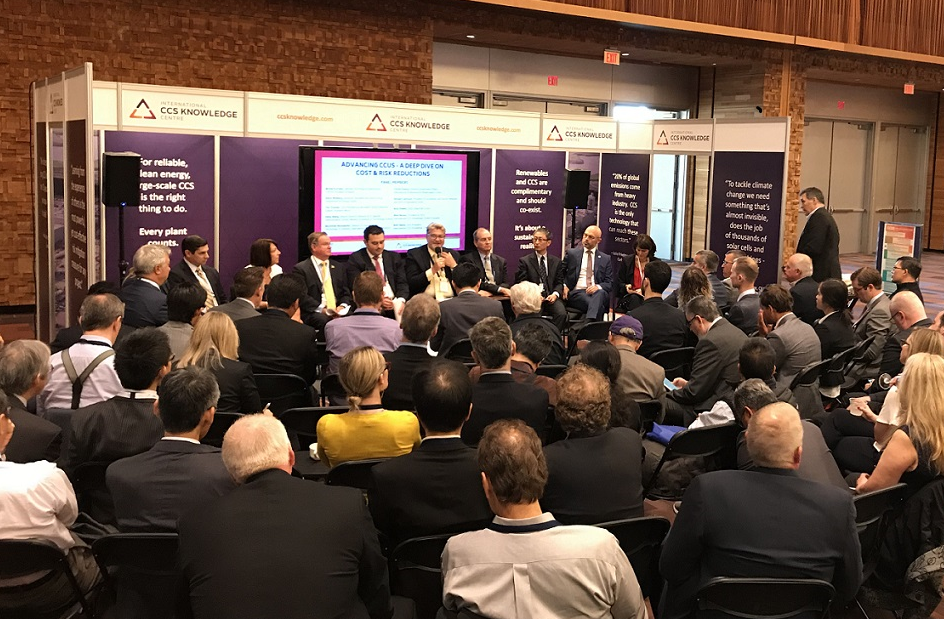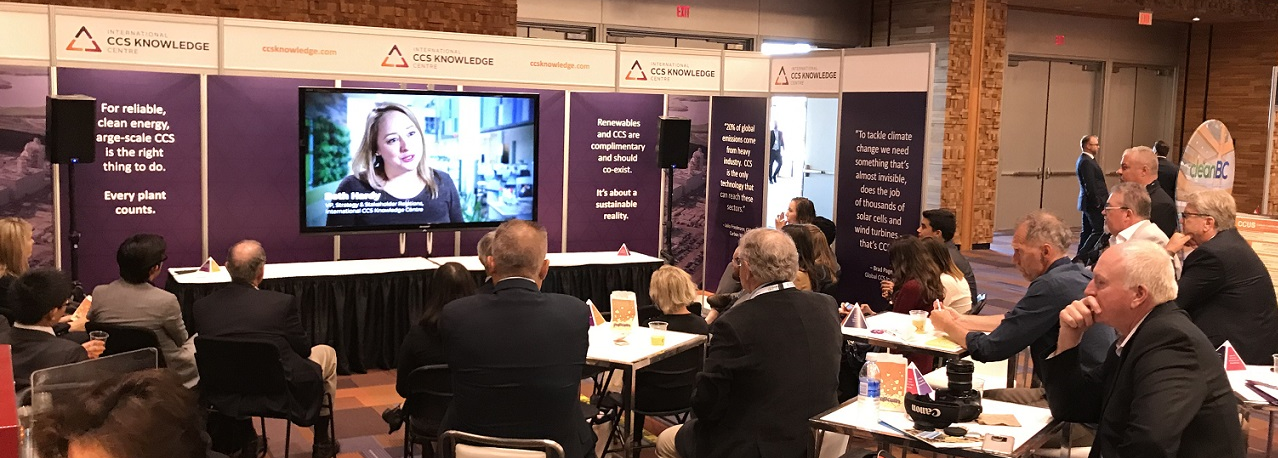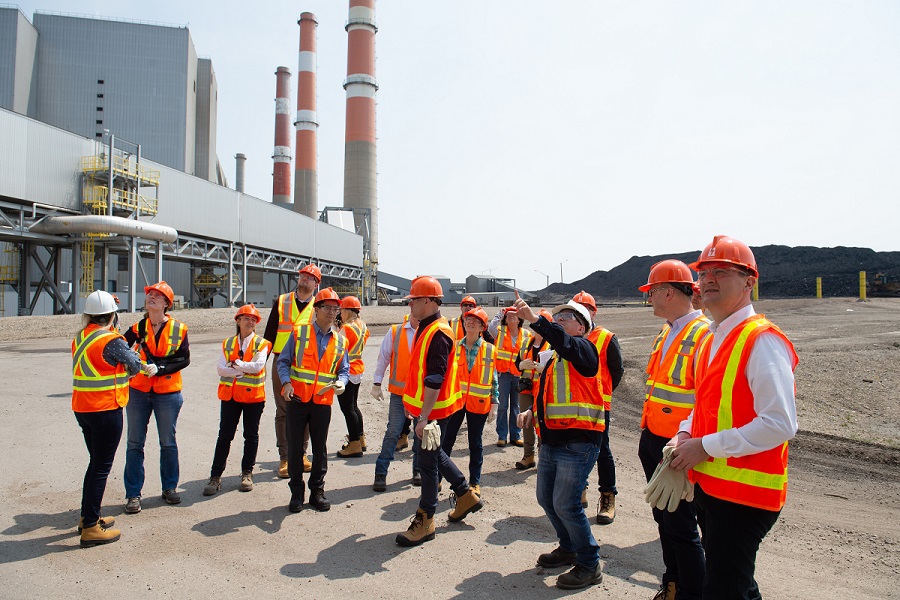The International CCS Knowledge Centre was delighted to play a key part in featuring carbon capture and storage (CCS or CCUS) at the Clean Energy Ministerial / Mission Innovation (CEM/MI) event held in Vancouver in May 2019.
Every year, CEM/MI host their annual event to foster clean energy action among member countries. This multi-day event welcomed ministers and high-level government delegates from over 25 countries, as well as senior officials and leaders from international organizations and industry.
CCS deployed at large-scale, was hailed as a proven and accessible technology to support clean energy by actively preventing millions and millions of tonnes of carbon dioxide (CO2) from entering the atmosphere.
ROBUST CCS AGENDA
The robust CCS agenda strategically focused attendees and strong messaging, “if you are really serious about reducing emissions then you better be serious about CCS,” challenged delegates to question, “am I really all in on GHGs?” It’s clear, the world will not reach climate targets without this technology and the time is now to advance CCS on energy and industrial sectors around the world.
Events that featured CCS included two panel sessions, a screening of the film, Bridge to a Cleaner Future, at a pavilion dedicated to CCS hosted by the International CCS Knowledge Centre, and a shoulder event touring international delegates at the renowned Boundary Dam 3 CCS Facility. Below is a summary of each event.
Accelerating CCUS Together – Financing a key piece of the clean energy puzzle
This offcial side event hosted by CEM’s CCUS Initiative, focused on Minister-level dialogue on key conditions for CCUS to attract financing for the next wave of CCUS projects. It provided a platform for financial sector CEOs and senior executives to discuss with ministers how to move forward in the short term to achieve tangible progress.
There were two parts to this event. The first of which focused on positive business models for CCS driven by well- tuned government policy. The speakers were:
-
Gordon Salahor, CEO, Wolf Midstream
-
Richard Jackson, President of Occidental Low Carbon Ventures and SVP of Operations
-
Khalid Abuleif, Chief Climate Navigator, Saudi Arabia
-
Mark Menezes, Under Secretary of Energy, U.S.
-
John Loughhead, Chief Scientist, BEIS, UK
The second part focused on increasing investment and the speakers were:
-
Yoshihiko Isozaki, State minister, Ministry of Economy, Trade and Industry, Japan
-
Liv Lonnum, State Secretary, Ministry of Petroleum and Energy, Norway
-
Amy Pincu, Managing Director, Bank of America Merrill Lynch
-
Ashok Bhargava, Director of Energy, Central and West Asia, Asian Development Bank
-
Sue-Ern Tan, CCUS Lead, Oil and Gas Climate Initiative
As noted by CEM’s CCUS Initiative report of the event there were five primary take-aways from this event:
-
Our energy mix has hardly changed over the past 30 years – and for this reason CCS must be part of the solution kit for the future.
-
Carbon capture and storage technologies are nothing new – the technology has been available for a long time; policy uncertainty is a much larger impediment to deployment.
-
Stable government policy is key to underpin investable projects – incentive mechanisms, policy drivers, business models, and simply a plan for CCUS are needed.
-
Banks are ready to play their role – CCUS needs to be included in the definition of clean energy for climate financing as well, CCUS would benefit from dedicated financial vehicles.
-
Collaboration between government, industry and the finance sector is absolutely vital – there is a global urgency in energy transformation and no stakeholder can do it alone; concerted and joint efforts across sectors is needed.
Advancing CCUS – A Deep dive into cost & risk reductions
Jointly co-hosted by the ClearPath and the International CCS Knowledge Centre, this panel discussion looked at the hurdles and possibilities in advancing CCUS as a key technology to significantly reduce greenhouse gas emissions.
The speakers were:
-
Steve Winberg, Assistant Secretary for Fossil Energy, Department of Energy, USA
-
Tim Thomas, Vice President at Mitsubishi Heavy Industries Houston office
-
Michal Kurtyka, Minister of Energy & Environment, COP24 President, Poland
-
Hang Wang, Deputy Director-General of 21 Agenda Administrative Centre, Ministry of Science & Technology, China
-
Cecile Conroy, Director Government Affairs, International Brotherhood of Boilermakers, (USA
-
Richard Jackson, President of Occidental Low Carbon Ventures and SVP of Operations, USA
-
Mechthild Worsdorfer, Director of Sustainability, Technology & Outlooks, International Energy Agency,Francerich
Moderators:
- Rich Powell, Executive Director, ClearPath
- Mike Monea, President & CEO, International CCS Knowledge Centre

-
We need everything in the mix – CCUS is not an exclusive club. All technologies are needed to meet goals to reduce GHG emissions – while maintaining a secure baseload energy for all citizens in the world.
-
We need to keep the pace on CCS in order to meet the 2 degree target – In the International Energy Agency (IEA) long-term scenario, the Intergovernmental Panel of Climate Change (IPPC), the European Commission long-term strategy, among others, there is a clear message that broad large-scale CCUS is needed.
-
International collaboration is essential – The climate crisis impacts the entire globe and therefore, active engagement and investment in CCUS is needed across the spectrum of industries as well as within national government and across borders.
-
Cost is no longer a barrier – CCUS has been subject to research, development and pilot projects around the world for over 25 years. The technology has proven itself and shows encouraging and significant cost reductions. Yet the largest gains in both knowledge and cost savings in any innovation advances from operating facilities.
-
It is policy that is the in the way, not the technology – CCUS technology is ready to be rapidly replicated. The barrier for CCUS to do its work for significant emission reduction lies with a willingness by governments to create and reform enabling policy and regulation.
Pavilion Dedicated to CCS
The International CCS Knowledge Centre hosted a pavilion dedicated to CCS. The goal was to use the platform to invite people to not only pause and think deeply and critically about the important role CCS can play in reducing emissions, but also focus sharply on moving forward. The presence and messaging on CCS – describing the success of the Shand CCS Feasibility Study that 2nd generation technology is more efficient and cost effective; and how necessary large–scale CCS is for climate mitigation – encouraged guests to understand the working evidence this technology has on emission reductions.

Tour of Boundary Dam 3 CCS Facility
Through pavilion visits, presentations, panel discussions, as well as the tour of Boundary Dam 3 CCS Facility (BD3) the impact was evident as hundreds of delegates over the course of CEM/MI actively engaged about CCS.

“I am here because of the role CCS knowledge from BD3 is playing on the international scene. We are talking about future collaborations because it is extremely important what is going on here [with CCS in Saskatchewan Canada],” said Mr. Kurtyka to a gathering of journalists. “What you [this project] brings to the table is extremely important. In terms of existing facilities and research, proving that costs can come down and that CCS can be a solution.” We have many challenges ahead with energy and societal transitions and you are taking a leading role.”